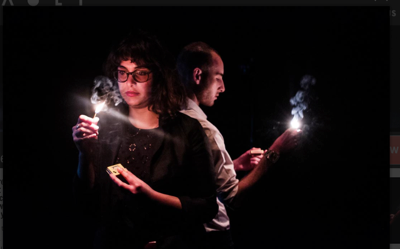
On Regret, a one act show devised and performed by Jonathan Rogerson and Nohar Lazarovich, promises a journey in time to all those moments that could have, would have or perhaps should have changed the course of our lives.
In an empty space, there are two microphone stands, and a large black and white still image from a film is projected onto the back wall’s screen: a woman with what appear a 1950s head dress.
Two performers address the audience directly and invite us to take part in a series of ‘exercises’ which will enable us to re-imagine our lives changed by events and people which we bumped into, or maybe just brushed passed… As the show unveils we realise it will be lighter in tone than the title ‘regret’ suggests: regret explored from the point of comedy? – a rare treat…

The image on the wall moves and we recognise Audrey Hepburn. She smiles knowingly and walks away, and a moment later we see Gregory Peck, slowly leaving the palace: hands in pockets and just one more turn to look back, where she stood a minute ago.
This fragment from the Roman Holiday (1953), one of the most memorable films Hepburn made, and which catapulted her to a stardom, is the only one used throughout the piece and I cannot help, but feel disappointed by the sparseness of imagery: such a big space, such a big screen, and only one fragment of one scene from one film…
The text, in correlation with the image, oscillates around missed romantic opportunities. Yet again I feel sting of rising disappointment. On Regret appears to be a show about only one form of regret, if one can even call it so: a wish to have a different/another sexual partner.
The tempo is fast, the physical score of a musical interlude has neither linear nor non-linear connection with anything else, but the same gestures are repeated so many times throughout the 50 minute long performance that the fragmented narrative feels exhaustingly familiar.
The main question of the show: ‘what would have happened if’ – is exciting as an idea, and could have provided a fertile ground for theatrical experimentation. Admittedly there is a humour, few loud laughs from the audience, and the atmosphere emanating from stage is that of a joyful encounter.
Even though the repetitive dialogue and physical movement are part of the concept, both the concept and underlying message (actions we wish we took and lines we wish we said) are within our grasp after about 10 minutes. The remaining 40 minutes are a simple repetition of the obvious without much variation. Boredom sets in and instead of experimentation and theatrical innovation we are fed a cluster of under-explored ideas and cliche choreography.
I cannot repress a desire to see more of Roman Holiday rather than the stage action, and I think of the films of Krzysztof Kieslowski: Blind Chance, The Double Life Of Veronique, Three Colours: Blue…
Sadly and regretfully, I wish I was home watching one of those instead…
by Anna Mors

Leave a Reply